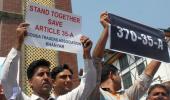The right to personal liberty is a ”precious and an inalienable right” and by attending to grievances alleging its violation the Supreme Court performs its ”plain constitutional duty, obligation and function; no more and no less”, a bench led by Chief Justice of India D Y Chandrachud-led said on Friday.
The observation came two days after Law Minister Kiren Rijiju said the Supreme Court should not be hearing "bail applications and frivolous PILs" when pendency of cases is so high.
"What are we here for if we do not listen to our conscience?" the bench, also comprising Justice P S Narasimha, said while dealing with the plea of a man from Uttar Pradesh called Iqram who was to suffer a jail term of 18 years in nine minor cases of theft of electrical equipment of the state electricity department.
No case is small for the Supreme Court, the bench said.
The top court set aside an Allahabad high court order and directed that Iqram's jail term of two years each in nine cases would run concurrently instead of successively. It was irked that neither the trial court nor the high court took note of the ”miscarriage of justice” and set things right.
”The right to personal liberty is a precious and an inalienable right recognised by the Constitution. In attending to such grievances, the Supreme Court performs the plain constitutional duty, obligation and function; no more and no less,” the bench said.
If the courts were not to do so, it said, a serious miscarriage of justice of the nature which has emerged in the present case would be allowed to persist and the voice of citizens whose liberty has been abrogated would not receive any attention.
The history of the apex court would indicate that it is in the seemingly small routine matters involving grievances of citizens that issues of importance both in jurisprudential and constitutional terms emerge, it said.
"The intervention by this court to protect the liberty of citizens is hence founded on sound constitutional principles embodied in Article 136 (special powers to grant relief under the Constitution)," the CJI said.
"If we do not act in matters of personal liberty and grant relief, then what are we doing here...We will be acting in breach of Article 136 if we do not act in the matter of personal liberty."
The apex court exists ”to hear to the cry of such petitioners” and the judges burn the midnight oil for such cases and see that there are more such matters, it observed.
Granting the relief, the bench said the facts of the present case provided another instance, a glaring one, indicating a justification for the top court to exercise its jurisdiction as ”a protector of fundamental right to life and personal liberty inherent in every citizen”.
Iqram was put to trial in the nine FIRs relating to incidents involving the theft of electrical equipment of the Uttar Pradesh electricity department. He moved a plea bargain application before the Hapur trial court which, in separate verdicts, awarded two years jail term in each case besides fines in 2020. The trial court had said the sentences would run concurrently.
”In our view, once petitioner espoused remedy of approaching the high court under Article 226 of the Constitution, the high court ought to have noticed the serious miscarriage of justice which will occur consequent upon trial court not having exercised specifically power...,” the Supreme Court said.
”The appellant moved the high court to mean that sentences should run concurrently, the high court, in our view should have intervened in exercise of its jurisdiction by setting right the miscarriage of justice..,” the apex court said.











 © 2025
© 2025